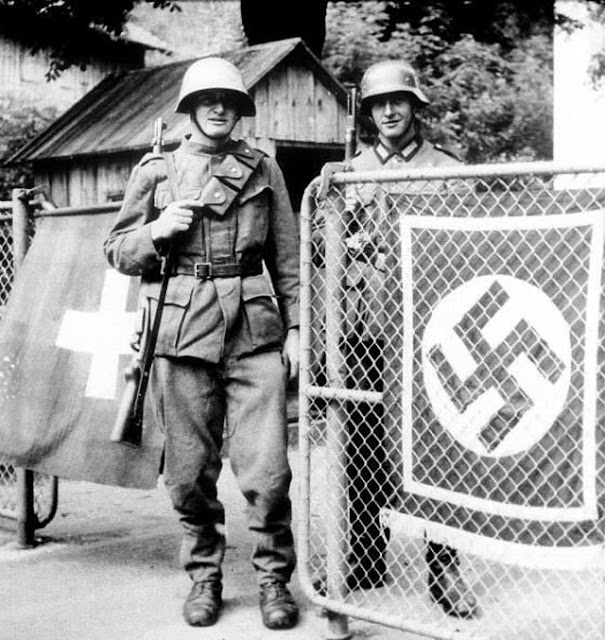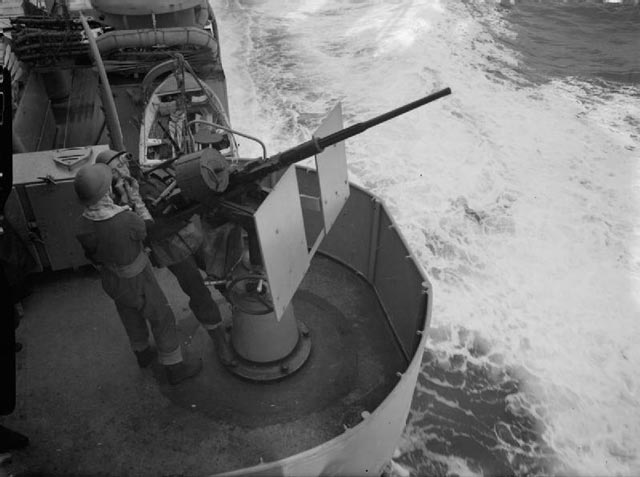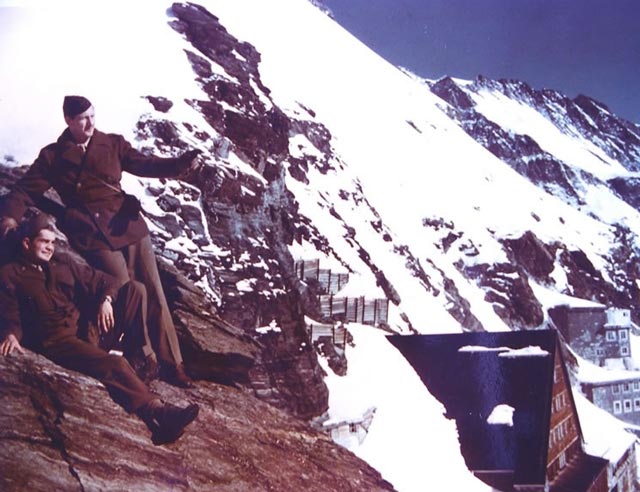Hitler Wanted To Invade Switzerland, But Never Got Around To It
 |
| Swiss Army troops during World War II. |
Let's see what we know. We'll break this down into chunks to make it manageable.
 |
| Hitler taking Blondi for a walk in the mountains. |
What Did Hitler Think of Switzerland?
There is surprisingly little information about how Hitler viewed Switzerland. The most we have to go on are a few offhand remarks that seemed to express a mixture of contempt, annoyance, and disdain. These were not unusual feelings in Hitler, but he usually acted on them. The difference with Switzerland is that Hitler never got annoyed enough to actually invade even though it was right next door.Trying to figure out what was in Hitler's mind about Switzerland is impossible. However, there are enough clues to at least provide a framework. Let's start from the beginning.
 |
| August Kubizek. |
While Hitler and Kubizek went their separate ways in 1908 when the former began a long stint in poverty, they reunited after Hitler became chancellor in 1933. Hitler unexpectedly replied to a congratulatory note from Kubizek and they met again on 9 April 1933 in Linz. Kubizek did some minor NSDAP work which involved writing about the young Hitler, and the two last met in 1940. Hitler even sent Kubizek's mother a fruit bowl on her 80th birthday in 1944 even as the world was starting to close in on him.
I know this seems to be getting off track, but we ignore trivia from Hitler's childhood at our peril. Many of Hitler's basic impulses stemmed from his early years, such as his views of politics, races, and military strategy, He showed a strong sentimentality at odd times, such as his quirky trip to Paris shortly after conquering it, the highlight of which was a visit to the Paris Opera. Switzerland was very Germanic and encapsulated many of the most romantic aspects of Kultur, such as remote mountain passes, craggy peaks, and self-sufficient (meaning well-armed) peasants. It also didn't hurt that Switzerland reportedly was 60% of Germanic descent. Hitler had nothing against Switzerland and thus no motivation to invade or destroy it.
 |
| Swiss industrialist Emil Georg Bührle, the longterm chairman and majority shareholder of the Oerlikon-Bührle AG and of German origin, was a German sympathizer. |
However, much as he might like the idea of Switzerland, Hitler did not seem to like the Swiss themselves. Tossing off one of his offhand opinions to Mussolini, Hitler opined that “Switzerland possessed the most disgusting and miserable people and political system,” in June 1941. Why, exactly, Hitler thought that is unclear.
 |
| George Elser tried to slip across the Swiss border after his failed attempt to assassinate Adolf Hitler. |
 |
| Unity Mitford with Hitler at the Berghof in Berchtesgaden. |
 |
| Female factory workers making gas masks in Geneva, Switzerland, during World War II. There was a good likelihood that these would be sold to the Reich. |
Hitler's attitude toward Switzerland seemed to harden as the war went on, though. He began to call it a "pimple on the face of Europe." General Franz Halder, the Chief of Staff of the OKH (Army High Command), recalled that Hitler often complained about Switzerland:
I was constantly hearing of outbursts of Hitler's fury against Switzerland, which, given his mentality, might have led at any minute to military activities for the army.This anger that Hitler felt toward Switzerland is never explained. But the important question is, did he ever do anything about it. The answer to that, which we'll get to below, is ... almost.
 |
| Swiss and German border guards in 1940. |
Was An Independent Switzerland Useful To Hitler
Switzerland was helpful to Hitler in a variety of ways. It helped the Reich, and there is some evidence that he valued it for more personal reasons, too. The Swiss went well out of their way to ingratiate themselves to the Third Reich. Their neutrality masked a great deal of accommodation to German objectives.It was well known that the majority of the Swiss population sided with the Allies. However, there were at least 40 fascist and superpatriotic nationalist societies in Switzerland during World War II. These had groups in more than 150 Swiss communities. The fascistic element was quite prevalent in the German-speaking cantons. The Swiss Fatherland Association fostered ties with the Reich and also with fascist Italy. While Swiss fascists were a minority, they were very influential, especially among military and industrial leaders.
 |
| One of three Junkers Ju 52 transport planes sold by Germany to Switzerland in October 1939. This was a training mission near Rapperswil, Switzerland (Swiss Aviation Museum). |
Switzerland also was a useful conduit to the outside world. It could obtain rare and essential items that Germany might not. German gold wasn't very useful if it couldn't be used to buy the things Germany needed. Switzerland helped it to do that.
Switzerland also helped to support the German economy. During the war, the German Reichsbank regularly made huge gold deposits to the Swiss National Bank. These totaled 1.638 billion Swiss francs. In effect, Switzerland acted as the Reich's reserve bank. The Allies did not like all these trade dealings but could not do much about them - except for putting Swiss firms on a blacklist. This blacklist was not lifted until well after World War II had ended.
 |
| "A 20 mm Oerlikon gunner onboard HMS DIDO getting a light from a pal between bombing attacks in the eastern Mediterranean." © IWM (A 9575). |
The Swiss also crossed the border to help the Reich's industrial plant directly. They built armaments factories inside Greater Germany. Somewhat incongruously, Dr. Max Huber, the Swiss president of the International Red Cross, owned several of these factories in southern Germany which ran on slave labor.
 |
| The US Army Air Force bombed Schaffhausen in April 1944. This was ascribed to poor navigation. |
Border guards also were not friendly to Allied soldiers trying to escape from the Reich into "neutral Switzerland." Several memoirs of escaped prisoners of war recall how they felt they were free once they got across the border - only to be turned back over to the Germans by the Swiss border guards.
 |
| German and Swiss border guards during World War II. |
Did Hitler Plan to Invade Switzerland?
There is evidence that Hitler planned to invade Switzerland eventually. He sarcastically said at one point that when the time was right, he would just send in the Berlin Fire Brigade to secure the country. However, Hitler had a tendency to vow to invade a place and yet never get around to it. When Albert Kesselring, for instance, argued strongly in favor of occupying Malta during 1942, Hitler replied, "Don't worry, Field Marshal, I will get to it!" However, as with Switzerland, he never did.The Swiss did what little they could to deter an invasion. During the 1930s, as Hitler's expansionist philosophy became an increasing threat, Swiss defense spending skyrocketed. From an already-high 15 million Swiss francs (out of a total budget of 100 million francs), it jumped to 90 million francs in 1935.
 |
| A Bf 109 in Swiss markings during World War II. |
At the outbreak of war on 1 September 1939, the Swiss issued Operationsbefehl Number 1 and called a general mobilization (age of eligibility raised from age 48 to 60). The Swiss Army only had three corps, which were oriented to the east, north, and west - against Germany. It began raising a new army corps of 100,000 soldiers, which was ready by the end of the year.
 |
| French (left) and Swiss troops on the border during World War II. |
Faced with this overwhelming force, the Swiss evolved the concept of the "national redoubt" (Réduit national). This was intended to make Switzerland harder to defeat and, frankly, not worth the trouble. Hitler at first wanted to invade anyway. Immediately after the French surrender, he had Captain Otto Wilhelm von Menges in Halder's OKH draft up an invasion plan for Switzerland. This later became Operation Tannenbaum.
 |
| A group of Wehrmacht soldiers chats with a Swiss border guard. |
However, the German invasion did not take place right away despite the transfer of the 12th Army to the western border of Switzerland in early July 1940. Perhaps Hitler was convinced that Switzerland was not a threat when, on 25 June 1940, Swiss Federal Councilor Marcel Pilet-Golaz made a radio address announcing demobilization. Menge updated his invasion plan on 12 August 1940. This plan, now named "Fall Schweiz" (Case Switzerland) foresaw Wehrmacht troops invading from the north and west, eventually linking up with Italian troops advancing from the south.
 |
| A Swiss border patrol in the Alps during World War II. |
The OKH continued updating the Menges invasion plan. A new plan was submitted on 27 August 1940 and given an operational code: Fall Grün (Case Green). This usually meant that a plan was serious. However, this was not put into effect, and the 12th Army submitted a new plan on 4 October 1940 which acquired the new name for which all the invasion plans would become known: Operation Tannenbaum. General Halder did not like this plan, however, because it required too many units (21 divisions) and had no operational subtlety. He sent it back to the 12th Army with orders to rework it to include a feint to draw out the defenders and also to reduce the size to 11 divisions.
 |
| A Swiss Army parade held on 1 August 1944, which was a Swiss National Holiday. In the rear is the Palace Hotel, where US officers are watching. |
Why Didn't Hitler Invade Switzerland?
By late 1940, Hitler's interest in invading Switzerland had evaporated even though he believed it could be completed within a few days. There were several reasons for this, but the most convincing reasons were that Hitler had other priorities by then and the Swiss were working with the Reich to benefit it in a way that only a neutral country could, as discussed above.
The air war with Great Britain was heating up and Hitler already had OKH officers working up initial plans for the invasion of the Soviet Union (Operation Barbarossa). Accordingly, on 11 November 1940, the OKH announced that Operation Tannenbaum was not "urgent" and stopped updating the plans. The Swiss quietly continued expanding their own military until it numbered 800,000 troops, making invading Switzerland an increasingly expensive proposition. With Switzerland's accommodating the Reich's trade needs, the whole perceived value of invading Switzerland disappeared.
Hitler also had a quirk in that he greatly admired peoples that he considered particularly warlike. Of course, he was quite selective about this and never seems to have given the Soviets any credit in this area. However, he was very respectful of captured Norwegian troops, for instance, and allowed them to return to their homes with some honor. He also greatly admired the Finns and, to a slightly lesser extent, the Spaniards. Hitler may have placed the Swiss in this class and figured there was no point defeating such a proud (and, to his way of thinking, inconsequential), people. He may have calculated that he did not need a guerilla war close to the heart of the Reich. That was one of the reasons he gave for not invading Spain.
Hitler ultimately seems to have just declared victory by claiming that much of Switzerland already was part of Germany anyway and leaving it at that. German textbooks during the Third Reich included maps of Greater Germany which included Holland, Belgium, Austria, Bohemia-Moravia, and western Poland from Danzig to Krakow. These were all accepted as having fallen under German rule. However, these maps also included the German-speaking parts of Switzerland. The Swiss authorities did not complain, but they certainly did not view parts of Switzerland as being in the Greater Reich. In a sense, Hitler got his victory over Switzerland and it didn't cost him any troops.
 |
| US soldiers on the Jungfrau Mountain in Switzerland in October 1945. |
Conclusion
As with many of Hitler's contemplated invasion plans such as the Canary Islands, Spain, and Great Britain, Operation Tannenbaum never took place. Relations between the Reich and Switzerland remained on good terms until the end of the war, much to the consternation of the Allies. This held true despite the Swiss shooting down almost a dozen Luftwaffe planes. At the end of the war, having a neutral Switzerland came in handy as a temporary haven for escaping war criminals and the site of some proposed peace initiatives (Reichsfuhrer-SS Heinrich Himmler, for instance, floated the idea of sending trains full of incarcerated Jews to Switzerland in exchange for certain concessions. The Swiss, however, paid for their collaboration with Hitler because it isolated them due to the Allied blacklist.It took years after the war for completely normal political and trade relations to resume between Switzerland and the victors of World War II. There are still odd vestiges to this day of the war that distinguish Switzerland from its neighbors - including the peculiar fact that the Hitler salute (Hitlergruß) is not always illegal there (unless used for improper purposes). Switzerland always marches to the beat of its own drummer, and that enabled it to escape the worst of World War II.
2020


No comments:
Post a Comment